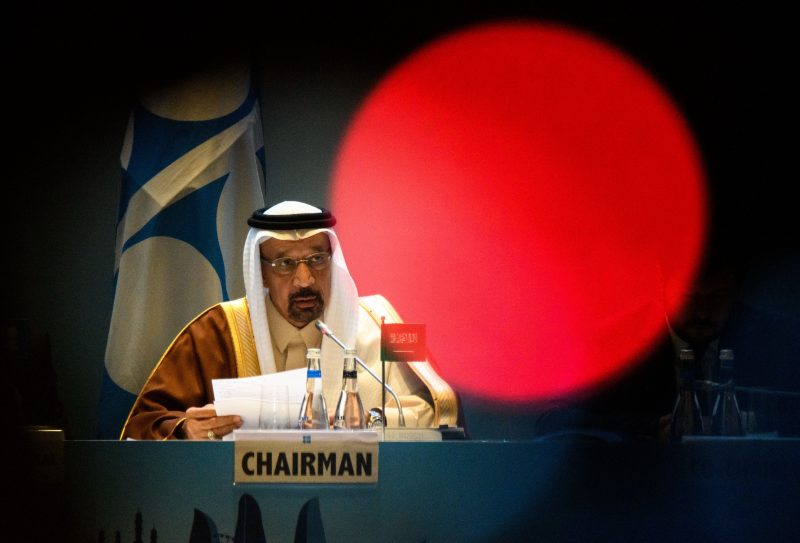OPEC and allies meet to review oil production cuts
Saudi energy minister Khalid al-Falih said in Azerbaijan’s capital Baku that OPEC+ countries were “close to implementing 90 percent” of the latest oil reduction agreement (Mladen ANTONOV)
Baku (AFP) – OPEC nations and allied oil producers met in Azerbaijan on Monday to review a strategy of production cutbacks that has propped up crude prices.
The Saudi-dominated Organisation of Petroleum Exporting Countries and Russia agreed in 2016 to create a loose alliance of 24 oil-producing nations to limit production in the face of tumbling prices.
The so-called OPEC+ alliance has endured, with regular meetings and agreements to extend production limits, helping oil prices rise from around $40 per barrel in 2016 to an average of $70 per barrel last year.
The meeting in Azerbaijan’s capital Baku brings together the group’s monitoring committee to review the last extension, which saw OPEC+ nations agree to cut production by 1.2 million barrels per day from January to June.
Another meeting is due in Vienna next month to consider extending the accord.
Russian news agencies quoted Energy Minister Alexander Novak as saying ahead of Monday’s meeting that Moscow was on track to meet its reduction target.
He suggested the next OPEC+ meeting should take place in May instead of April, saying time was needed to understand the impact of US sanctions on OPEC members Iran and Venezuela.
“It is hard today to plan your activities for months ahead, because the volatility is high because of the sanctions. We have to take these uncertainties into account in making decisions on the market,” Interfax quoted Novak as saying on Sunday.
– Impact of sanctions –
President Donald Trump pulled the United States out of a nuclear accord with Iran in May last year and reimposed sanctions on Tehran.
From April 28, US companies and citizens will be barred from dealing in Venezuelan crude, as Washington intensifies measures against President Nicolas Maduro’s government.
But Trump has also urged OPEC to take steps to lower prices, saying in a tweet last month: “Oil prices getting too high. OPEC, please relax and take it easy.”
Saudi energy minister Khalid al-Falih was defiant in response, saying at the time that OPEC was pursuing a measured response and that he was leaning towards extending production cuts in the second half of 2019.
In Baku ahead of the talks, Falih said on Sunday that OPEC+ countries were “close to implementing 90 percent” of the latest reduction agreement.
The Azerbaijan meeting was also looking at expanding membership of the OPEC+ group, with Falih saying Iraq, Kazakhstan and Nigeria had been invited to participate.
The alliance has breathed fresh life into OPEC and brought Russia new influence as an arbiter on the oil market.
Host Azerbaijan is one of the alliance’s non-OPEC members and analysts said the ex-Soviet republic has used its participation to court investment in its oil sector.
After years of growth, Azerbaijan’s oil and gas production is stabilising.
Analysts at S&P Global Platts said the country is forging closer ties with Riyadh and in recent weeks hosted several Saudi delegations.
Azerbaijan “needs to attract new investment if it is to successfully replace current reserves and maintain production volumes over the next few decades,” they said.
Disclaimer: This story is published from a syndicated feed. Siliconeer does not assume any liability for the above story. Validity of the above story is for 7 Days from original date of publishing. Content copyright AFP.


